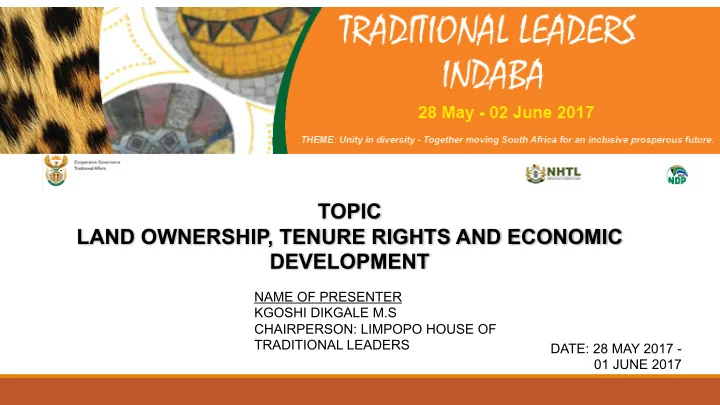

TOPIC LAND OWNERSHIP, TENURE RIGHTS AND ECONOMIC DEVELOPMENT NAME OF PRESENTER KGOSHI DIKGALE M.S CHAIRPERSON: LIMPOPO HOUSE OF TRADITIONAL LEADERS DATE: 28 MAY 2017 - 01 JUNE 2017
INTRODUCTION • Rights to Land is an inclusive expression including all the different types of rights to land e.g. communal. • Land Tenure (ownership) in the western world points to ownership which cannot be compared to the rights of individuals under the traditional system. • Rights to use denotes the particular nature of rights to land under the communal system which is not rights of tenure in the western usage viz the right of occupation, right of tilling and the right of grazing which is communal. • Economic Development is a process whereby an economy’s real national income as well as per capital income increases over a long time.
CONCEPTUAL FRAMEWORK OF RIGHTS TO LAND Concept of Man/land relationship Social system’s spatial regulating of Land man/relationship with land Western Measured • Land Tenure (Ownership) • Contractual and hereditary Concepts Units succession African Variable • Communal rights (Rights of use, rights of • Status within group: Kings, Senior Concepts (Genealogical occupation, rights of tilling, rights of grazing) Traditional Leaders. ly or socio • Rights to use, namely; tilling, politically occupation and grazing with their determined) communities. • Sites allocated by Headmen/women in consultation with Senior Traditional Leaders. • Areas for tilling and grazing identified by Headmen/women in consultation with Extension Officers. • P.T.O issued by TC for site only
CONCEPTUAL FRAMEWORK OF RIGHTS TO LAND cont.….. • The descendants of the people who took the land are afforded great privilege in life while the rest of us have to struggle on and have to pay them rent. This injustice is being sustained down the generations. The wealthy get wealthier because the rest of us have to constantly pay them rent of land which their ancestors stole from all our common ownership. ECONOMIC DEVELOPMENT • There can be no economic development if land is still owned by few. • Land is wealth and if not availed to all the poor will get poorer.
THE DEVELOPMENT OF THE LIMPOPO SPATIAL PLANNING AND LAND USE MANAGEMENT POLICY AND BILL (SPLUM) BACKGROUND • SPLUM signed into law in 2013. • SPLUMA implemented in 2015. • Decentralise land use management function exclusively to Municipalities. • Does not address all Provinces specific issues. • Limpopo Traditional Leaders objected the implementation of SPLUM in their areas of jurisdiction. • Traditional Leaders under the leadership of the House submit memorandum to Government in 2016. • The Office of the Premier engage Traditional Leaders. • The engagement resulted in the development of a Provincial Policy, Bill and Regulations on Spatial Planning and Land Use Management for the Limpopo Province. • Process to develop an appropriate law for Limpopo Province conscious of its unique circumstances within a National Framework started. • Limpopo Province is 82% rural and 18% urban. • Establishment of a formal conduit for cooperative governance in LSPLUM.
SPATIAL PLANNING AND LAND USE MANAGEMENT ON COMMUNAL LAND • Participation of Traditional Authorities in Land Use Management and Development process enabled in terms of section 36 (1)(b) of SPLUMA. • Traditional Authorities to perform the functions of Traditional Councils until the Traditional Councils are in place. • Section 23(2) of SPLUMA allows for the participation of Traditional Councils in Land Use Management. • Section 36 of SPLUMA specifies MPT composition. This section has been used to allow the participation of Traditional Councils.
MODEL FOR LAND USE IN RURAL AREAS Headman/woman Headman/woman Applicant looking for confirms land in took application to a piece of land consultation with Traditional Council Ward Councillor for recommendation Municipality Applicant takes the Municipal planning categorisation of land recommendation to tribunal applications Municipality
KEY PROVISIONS ON THE PROPOSED BILL 1. Inclusion of Traditional Authorities in the Land Development application process. • Confirmation of site for development. 2. Representative in the Municipal Planning Tribunal (MPT) • A permanent representative of the Traditional Council for duration of term of the MPT. • An adhoc representative of the Traditional Council who will only appear when an MPT is dealing with land applications in areas under their jurisdiction. 3. Representative in the Appeal Authority. • A permanent representative of the Traditional Council who is not a member of MPT. 4. Amending by-laws of Municipalities to align with the Limpopo SPLUM Legislation.
SPLUMA COMPLIANCE • Section 23(2) – participation of a Traditional Council in Land Use Management. • Section 36 MPT composition to include Traditional Council. • Appeal Authority to include Traditional Council.
CONCLUSION • The Institution of Traditional Leadership is not static but dynamic and ready to change if that change is for its people. Remember 13% we own.
NDAA! INKOMU! MOSHATE!
Recommend
More recommend